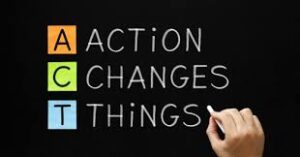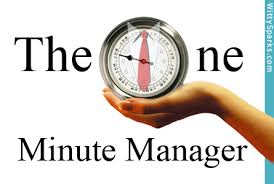You are out running in the park. Instead of your mind thinking about the office tasks on Monday, your attention is focused on the act of running and nothing else. You can feel the ground beneath your feet, the tension in your legs and how you are feeling as you breathe in and out. You are somehow completely focused on this and nothing else seems to matter. Suddenly you notice you have been running for twice as long as usual and you are not even tired.


 The One Minute Manager by Ken Blanchard and Spencer Johnson is one of the best-selling books of all time with 13 million copies published in 37 languages. It is written in story fashion about a young man searching for an effective manager that he can work with. He finds mostly managers who just care about the organization and its results not about the people. He also finds managers who care about the people but their organizations suffer due to lack of attention to organizational goals…
The One Minute Manager by Ken Blanchard and Spencer Johnson is one of the best-selling books of all time with 13 million copies published in 37 languages. It is written in story fashion about a young man searching for an effective manager that he can work with. He finds mostly managers who just care about the organization and its results not about the people. He also finds managers who care about the people but their organizations suffer due to lack of attention to organizational goals… You go shopping for office clothes – and end up with three casual shirts and two pairs of jeans you just knew you wanted. You decide to go for a salad and soup meal and end up in an expensive restaurant with an impressive menu and end up ordering much more than you can eat. None of these incidents is unusual, but as time passes, your choices amount to a mounting and consistent trade off: You’re choosing pleasure now in exchange for some possible financial discomfort in the future.
You go shopping for office clothes – and end up with three casual shirts and two pairs of jeans you just knew you wanted. You decide to go for a salad and soup meal and end up in an expensive restaurant with an impressive menu and end up ordering much more than you can eat. None of these incidents is unusual, but as time passes, your choices amount to a mounting and consistent trade off: You’re choosing pleasure now in exchange for some possible financial discomfort in the future.
 Are you content to be like everyone else and just coast along or are you looking to get on a new trajectory of differentiating yourself so that you can stand out from the rest of the crowd? I wanted to take this opportunity to offer some really helpful insights on how to go about creating such differentiation in yourself. Here are 4 key strategies:
Are you content to be like everyone else and just coast along or are you looking to get on a new trajectory of differentiating yourself so that you can stand out from the rest of the crowd? I wanted to take this opportunity to offer some really helpful insights on how to go about creating such differentiation in yourself. Here are 4 key strategies: Just as there are physical laws that describe and govern the behavior of physical phenomena, so there are mental laws that describe and govern our thinking and the behavior. The application of these mental laws is what is referred to as mental technology. This a bit like the software that drives how we think and what we do. Here are the 10 laws:
Just as there are physical laws that describe and govern the behavior of physical phenomena, so there are mental laws that describe and govern our thinking and the behavior. The application of these mental laws is what is referred to as mental technology. This a bit like the software that drives how we think and what we do. Here are the 10 laws:
Recent Comments